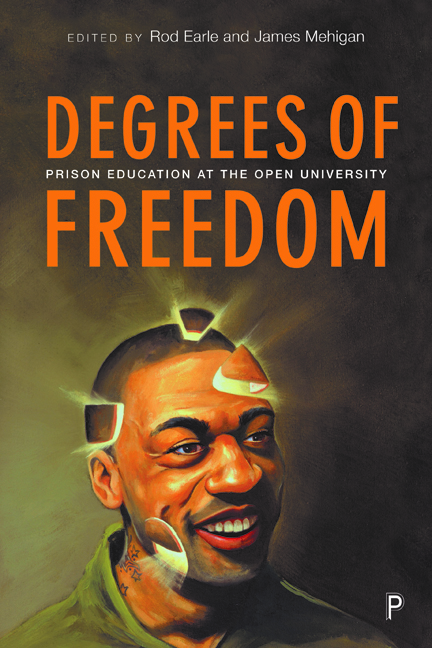Book contents
- Frontmatter
- Dedication
- Contents
- Notes on Contributors
- Acknowledgements
- 1 Openings and Introductions: Education for the Many, Prison for the Few
- 2 From Prisoner to Student
- Vignette 1 Choosing My Journey
- 3 Pioneers and Politics: Open University Journeys in Long Kesh During the Years of Conflict 1972–75
- Vignette 2 Avoiding the Mind-Numbing Vortex of Drivel …
- 4 A University Without Walls
- Vignette 3 Starting a New Chapter
- 5 Open Universities, Close Prisons: Critical Arguments for the Future
- Vignette 4 Out of the Abysmal
- 6 The Light to Fight the Shadows: On Education as Liberation
- 7 From Despair to Hope
- Vignette 5 Making my Commitment
- 8 Straight Up! From HMP to PhD
- 9 From Open University in Prison to Convict Criminology Upon Release: Mind the Gap
- Vignette 6 Message to a Prisoner
- 10 From the School of Hard Knocks to the University of Hard Locks
- 11 Becoming me with The Open University
- Vignette 7 Catching up with Kafka
- 12 From D102 to Paulo Freire: An Irish Journey
- Vignette 8 My Journey, My New Life
- 13 Ex-Prisoners and the Transformative Power of Higher Education
- Vignette 9 Prison Choices: Taking a Degree or Packing Tea?
- 14 What the OU did for me
- Appendix Study with The Open University
- Index
6 - The Light to Fight the Shadows: On Education as Liberation
Published online by Cambridge University Press: 11 March 2021
- Frontmatter
- Dedication
- Contents
- Notes on Contributors
- Acknowledgements
- 1 Openings and Introductions: Education for the Many, Prison for the Few
- 2 From Prisoner to Student
- Vignette 1 Choosing My Journey
- 3 Pioneers and Politics: Open University Journeys in Long Kesh During the Years of Conflict 1972–75
- Vignette 2 Avoiding the Mind-Numbing Vortex of Drivel …
- 4 A University Without Walls
- Vignette 3 Starting a New Chapter
- 5 Open Universities, Close Prisons: Critical Arguments for the Future
- Vignette 4 Out of the Abysmal
- 6 The Light to Fight the Shadows: On Education as Liberation
- 7 From Despair to Hope
- Vignette 5 Making my Commitment
- 8 Straight Up! From HMP to PhD
- 9 From Open University in Prison to Convict Criminology Upon Release: Mind the Gap
- Vignette 6 Message to a Prisoner
- 10 From the School of Hard Knocks to the University of Hard Locks
- 11 Becoming me with The Open University
- Vignette 7 Catching up with Kafka
- 12 From D102 to Paulo Freire: An Irish Journey
- Vignette 8 My Journey, My New Life
- 13 Ex-Prisoners and the Transformative Power of Higher Education
- Vignette 9 Prison Choices: Taking a Degree or Packing Tea?
- 14 What the OU did for me
- Appendix Study with The Open University
- Index
Summary
Realising one of your childhood aspirations is a strange feeling. Ever since I was a kid, one of my ambitions was to write a book. Reading books has always been a massive part of my life, regardless of whether I was engaged in offending behaviour or not. I would always tell people that I wanted to enter a shop like Waterstones and find something I had written on the shelves to experience the sense of achievement I am sure it would bring. Therefore, I feel privileged as well as excited to be given the opportunity to contribute to the book Degrees of freedom, conceived to celebrate the 50th anniversary of The Open University (OU).
Funnily enough, I had always wanted to go to university and study for a degree too. However, bad decision-making signposted me towards a life of offending and incarceration. It wasn't until I had been handed down a custodial term of 16 years in 2003 that I realised my life was at a monumental crossroads. At that time, I was 21 years old and knew that the prospect of an eternity of crime and prison – perhaps even premature death – hung over my head like the Sword of Damocles. Unfortunately, this was my third stint behind bars and I was well aware that all of my ‘legal lives’ were used up. If I was going to transcend the ruins of my life, it was now or never. In this way, I recognised that the way I chose to use my time in custody would likely define how I would live the rest of my days.
Interestingly, Cusson and Pinsonneault (1986, p 57) found that several factors precipitated the cessation of offending behaviour in a qualitative study of former bank robbers: ‘shock (such as being wounded in a bank raid); growing tired of doing time in prison; becoming aware of the possibility of longer prison terms; and a reassessment of what is important to the individual’. In retrospect, I can see how these processes paralleled my own situation. While I had put my ‘injuries’ to the back of my mind, it wasn't until I had time to reflect on my lifestyle that it dawned on me that I was lucky to be alive.
- Type
- Chapter
- Information
- Degrees of FreedomPrison Education at The Open University, pp. 97 - 110Publisher: Bristol University PressPrint publication year: 2019

